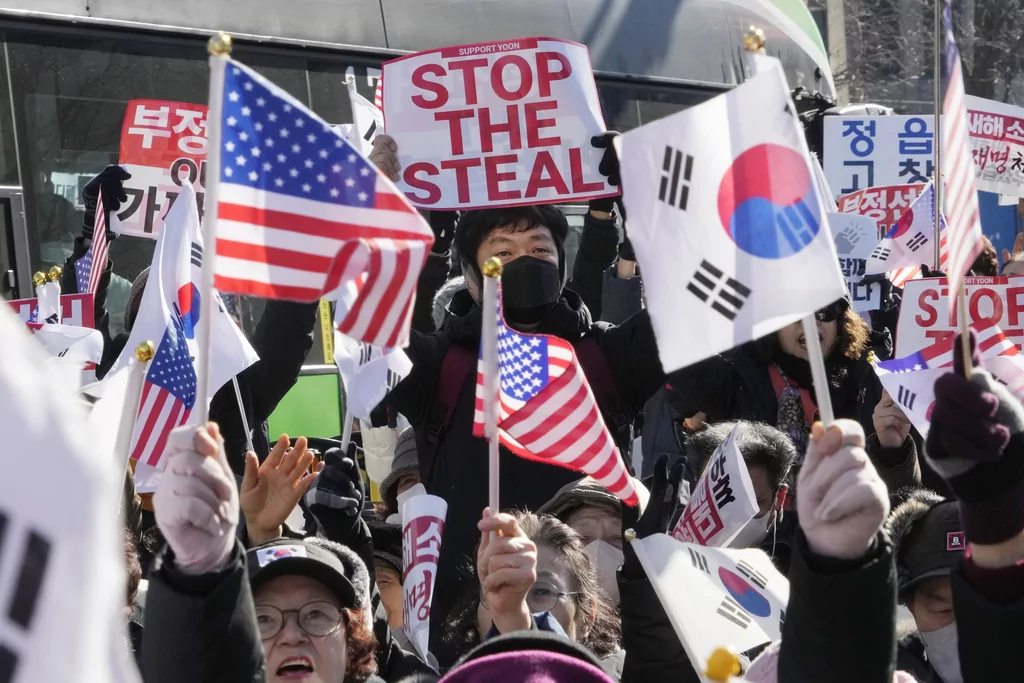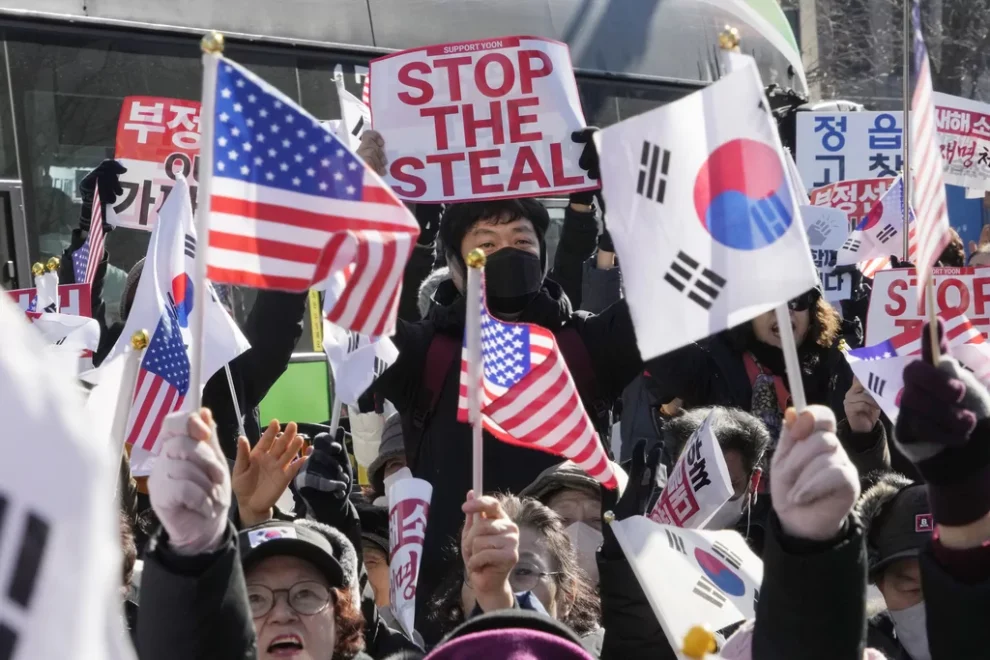South Korean protesters adopted United States symbols and slogans to signal their support in the country’s political crisis.
The supporters of ousted conservative President Yoon Suk Yeol have found common cause with conservatives in the U.S., drawing parallels between their situation and President-elect Donald Trump’s. On Friday, pro-Yoon protesters flew the American flag, sang the “Star Spangled Banner,” and held signs reading, “STOP THE STEAL,” a reference to Trump’s questioning of the 2020 election results.
INTEL COMMUNITY INSIDERS WARN AGAINST TULSI GABBARD AS DNI

On the flipside, some anti-Yoon figures resorted to an unorthodox choice to signal their opposition — the Virginia state flag.
Over 7,000 miles away from Richmond, the flag was flown by the mayor of Gwangju outside the City Hall. The appeal of the flag lies in the motto, “Sic Semper Tyrannis,” or “Thus always to Tyrants,” an ancient Latin phrase used in the U.S. during the Revolutionary War but better known as the cry of John Wilkes Booth after his assassination of President Abraham Lincoln.
“It’s the morning of arresting a tyrant, Yoon Suk Yeol,” Gwangju Mayor Kang Gi-jung wrote in a Facebook post on the day of Yoon’s failed arrest.
RFK JR. ON ULTRAPROCESSED FOOD: THE SCIENCE ON FOOD DYES, GLYPHOSPHATE, AND SEED OILS
According to a press release from Gwangju, the flag was gifted to the city by Gov. Glenn Youngkin (R-VA) as a sign of appreciation for its hospitality after the reception of a Virginian delegation to discuss agricultural cooperation on Nov. 18. The flag had been previously flown at the state capitol in Richmond.
“The state flag and certificate of appreciation sent by the Governor of Virginia have arrived,” Kang was quoted as saying. “The phrase written on the flag… is meaningful. It is a universal truth that those who abuse power will inevitably end up in ruin.”
Jaechun Kim, a political scientist at Sogang University in Seoul, told the Washington Post that the use of the flag was more an appreciation of the slogan rather than an appreciation for Virginia.
On the pro-Yoon side, many protesters see Trump as an ally and expect his intervention on their side.
“In America, Trump was criticized a lot for his concerns about election fraud. … This is to appeal to that,” Na Yoon-seop, 58, told the outlet outside of Yoon’s residence. “The moment Trump was elected, I thought things will finally get better again, so I cheered wholeheartedly.”
TOM COTTON, THE SENATE GOP’S NEXT POWERBROKER
Yoon’s most loyal base shares some similarities with Trump’s as well, consisting of many Evangelical Christians.
Pyongyang, previously called the “Jerusalem of the East,” was once the center of Christianity in East Asia, nurtured largely by American Protestant missionaries. After the takeover by the atheistic communist regime of Kim Il-Sung, most North Korean Christians followed retreating American troops south during the Korean War, settling in South Korea. The influx contributed to South Korea developing some of the largest shares of Christians in all of East Asia.
Those surviving and their descendants view the U.S. as their protector and responsible for South Korea’s rise during the latter half of the 20th century. As in the U.S., Evangelical Christians are among the most conservative and most politically active demographics. They helped Yoon, also a Christian, stay afloat despite historically low approval ratings. The current crisis isn’t the first time they have drawn parallels with political developments in the U.S., with Yoon’s 2022 victory being compared to Trump’s rise.
CLICK HERE TO READ MORE FROM THE WASHINGTON EXAMINER
On Dec. 4, Yoon declared martial law for the first time in South Korea since 1980 and for the first time since the country became a democracy. His rationale was alleged pro-North Korean interests taking control of parliament and other “anti-state” forces. Immediately, opposition lawmakers rushed to the National Assembly, jumping over barricades and locking out special forces soldiers. Before the soldiers could enter the chamber, parliament unanimously voted to overturn martial law, leading to its end six hours later.
Yoon was impeached and removed from office, as was his successor shortly after. The South Korean government attempted to arrest Yoon on Friday, only to stand down following a six-hour standoff with his security detail.
























